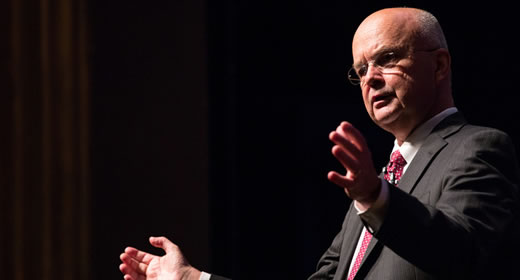
Four-star general Michael Hayden, retired U.S. Air Force, delivered the Ford School's annual Josh Rosenthal Education Fund Lecture last Friday, September 7—closing out the first week of fall 2012 semester at the Ford School. Former director of the Central Intelligence Agency (CIA) and the National Security Agency (NSA), General Hayden spoke on "Law, policy, and the war on al-Qaida: An emerging consensus" to an audience of more than 200 students, faculty, and U-M community members at the Lydia Mendelssohn Theatre.
General Hayden's lecture was also the first of the school year in the Policy Talks @ the Ford School series, which brings distinguished speakers from across the spectrum of the policy world to talk about today's most pressing topics.
After the lecture, General Hayden, accompanied by his wife Jeanine Carrier Hayden, spoke informally with Ford School master's students as part of Graduate Career Services' Career Conversations—a highlight of the visit. Career conversations give MPP and MPA students the opportunity to receive advice from seasoned policy professionals in a small setting and learn about the variety of career paths they might pursue with a Ford School degree.
Before helming the CIA, Gen. Hayden had been the highest-ranking intelligence officer in the armed forces, charged not only with collecting information about America's adversaries but also producing timely analysis and conducting covert operations. Hayden discussed the current intelligence community and the importance of policy analysts. When asked "Why policy wonks?" Hayden responded: "Disciplined thinking. A broad understanding of what sources to believe and what not to believe…how do you search for knowledge, how do you aggregate knowledge, how do you test hypotheses?"
Perhaps surprisingly, his original intention had not been to work in intelligence. "He got struck by lightning," Mrs. Hayden offered—referring to the general's decision to attend graduate school, the first in a series of moves that shifted Gen. Hayden's plans from pilot to intelligence officer.
The general added that a chance meeting at the pentagon early in his career, with a captain who had previously worked for him, led to his next assignment—an encounter that solidified his direction toward intelligence. "This is my career counseling advice: just do the job you're doing," Hayden said—emphasizing a certain preparedness when lightning strikes.